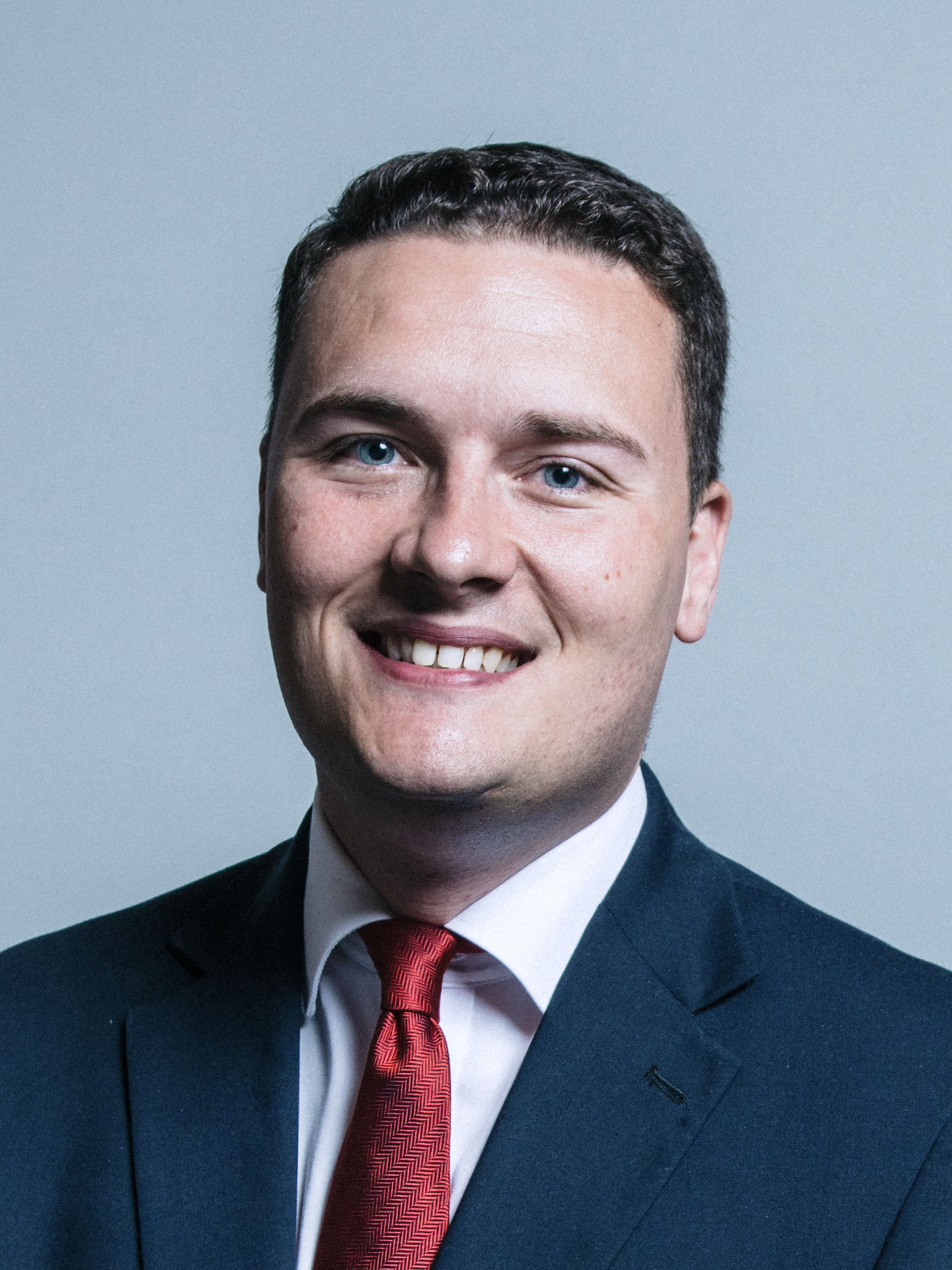Department of Health and Social Care
We support ministers in leading the nation’s health and social care to help people live more independent, healthier lives for longer.
Shadow Ministers / Spokeperson
Liberal Democrat
Helen Morgan (LD - North Shropshire)Liberal Democrat Spokesperson (Health and Social Care)
Danny Chambers (LD - Winchester)
Liberal Democrat Spokesperson (Mental Health)
Lord Scriven (LD - Life peer)
Liberal Democrat Lords Spokesperson (Health)
Scottish National Party
Seamus Logan (SNP - Aberdeenshire North and Moray East)Shadow SNP Spokesperson (Health and Social Care)
Green Party
Adrian Ramsay (Green - Waveney Valley)Green Spokesperson (Health)
Conservative
Stuart Andrew (Con - Daventry)Shadow Secretary of State for Health and Social Care
Junior Shadow Ministers / Deputy Spokesperson
Conservative
Lord Kamall (Con - Life peer)Shadow Minister (Health and Social Care)
Caroline Johnson (Con - Sleaford and North Hykeham)
Shadow Minister (Health and Social Care)
Junior Shadow Ministers / Deputy Spokesperson
Conservative
Luke Evans (Con - Hinckley and Bosworth)Shadow Parliamentary Under Secretary (Health and Social Care)
Ministers of State
Stephen Kinnock (Lab - Aberafan Maesteg)Minister of State (Department of Health and Social Care)
Karin Smyth (Lab - Bristol South)
Minister of State (Department of Health and Social Care)
Parliamentary Under-Secretaries of State
Baroness Merron (Lab - Life peer)Parliamentary Under-Secretary (Department of Health and Social Care)
Ashley Dalton (Lab - West Lancashire)
Parliamentary Under-Secretary (Department of Health and Social Care)
Zubir Ahmed (Lab - Glasgow South West)
Parliamentary Under-Secretary (Department of Health and Social Care)
14:44
Written Evidence
The Committee is holding an inquiry into what is needed from the NHS estate to deliver the Government’s vision of …
To ask His Majesty's Government, further to the Written Answer by Baroness Merron on 13 January (HL13304), what plans there …
These Regulations amend the Human Medicines Regulations 2012 (“the 2012 Regulations”), which govern the arrangements across the United Kingdom for …
A Bill to Make provision about the prioritisation of graduates from medical schools in the United Kingdom and certain other …
17:02
News and Communications
Department of Health and Social Care Commons Appearances
Oral Answers to Questions is a regularly scheduled appearance where the Secretary of State and junior minister will answer at the Dispatch Box questions from backbench MPs
Other Commons Chamber appearances can be:- Urgent Questions where the Speaker has selected a question to which a Minister must reply that day
- Adjornment Debates a 30 minute debate attended by a Minister that concludes the day in Parliament.
- Oral Statements informing the Commons of a significant development, where backbench MP's can then question the Minister making the statement.
Westminster Hall debates are performed in response to backbench MPs or e-petitions asking for a Minister to address a detailed issue
Written Statements are made when a current event is not sufficiently significant to require an Oral Statement, but the House is required to be informed.
Most Recent Commons Appearances by Category
Bills currently before Parliament
Department of Health and Social Care does not have Bills currently before Parliament
Acts of Parliament created in the 2024 Parliament
A Bill to make provision to amend the Mental Health Act 1983 in relation to mentally disordered persons; and for connected purposes.
This Bill received Royal Assent on 18th December 2025 and was enacted into law.
Department of Health and Social Care - Secondary Legislation
Petitions
e-Petitions are administered by Parliament and allow members of the public to express support for a particular issue.
If an e-petition reaches 10,000 signatures the Government will issue a written response.
If an e-petition reaches 100,000 signatures the petition becomes eligible for a Parliamentary debate (usually Monday 4.30pm in Westminster Hall).
(14,508 in the last 7 days)
(10,161 in the last 7 days)
(6,365 in the last 7 days)
(5,544 in the last 7 days)
(4,360 in the last 7 days)
(1,236 in the last 7 days)
(4,360 in the last 7 days)
(1,068 in the last 7 days)
(10,161 in the last 7 days)
(2,045 in the last 7 days)
Petition Closed
Increase funding for people with Parkinson’s and implement the "Parky Charter"
Gov Responded - 29 Apr 2025closed 4 months, 4 weeks ago
We want the government to take the decisive five steps set out in the Movers and Shakers' "Parky Charter" and to fulfil the Health Secretary’s promises.
Departmental Select Committee
Health and Social Care Committee
Commons Select Committees are a formally established cross-party group of backbench MPs tasked with holding a Government department to account.
At any time there will be number of ongoing investigations into the work of the Department, or issues which fall within the oversight of the Department. Witnesses can be summoned from within the Government and outside to assist in these inquiries.
Select Committee findings are reported to the Commons, printed, and published on the Parliament website. The government then usually has 60 days to reply to the committee's recommendations.
11 Members of the Health and Social Care Committee

Health and Social Care Committee Member since 9th September 2024

Health and Social Care Committee Member since 21st October 2024

Health and Social Care Committee Member since 21st October 2024

Health and Social Care Committee Member since 21st October 2024

Health and Social Care Committee Member since 21st October 2024

Health and Social Care Committee Member since 21st October 2024

Health and Social Care Committee Member since 21st October 2024

Health and Social Care Committee Member since 21st October 2024

Health and Social Care Committee Member since 21st October 2024

Health and Social Care Committee Member since 28th October 2024

Health and Social Care Committee Member since 17th March 2025
Health and Social Care Committee: Upcoming Events
10 Feb 2026, 1:30 p.m.
View calendar - Save to Calendar
Health and Social Care Committee - Oral evidence
Vaccinations
11 Feb 2026, 9:15 a.m.
View calendar - Save to Calendar
Health and Social Care Committee: 9 Current Inquiries
Health and Social Care Committee: Previous Inquiries
50 most recent Written Questions
(View all written questions)Newly licensed medicines are appraised by the National Institute for Health and Care Excellence (NICE), which is the independent body responsible for developing evidence-based guidance for the National Health Service on whether new medicines represent a clinically and cost-effective use of resources. NICE aims wherever possible to issue draft guidance on new medicines close to the time of licensing. The NHS in England is legally required to fund drugs recommended by NICE, usually within three months of final guidance.
NICE is currently evaluating potential new treatments for metabolic dysfunction-associated steatohepatitis (MASH) in anticipation of the medicines being granted a marketing authorisation by the Medicines and Healthcare Products Regulatory Agency (MHRA) with guidance expected later this year. NHS England is actively preparing to support the potential introduction of new treatments for MASH, including fatty liver disease with fibrosis, alongside the ongoing NICE appraisal process.
The Department and NHS England will continue to work to ensure that, once approved, effective new treatments for fatty liver disease are introduced in a way that is fair, affordable and protects the wider NHS, while ensuring that patients with the greatest clinical need are able to benefit as quickly as possible.
Parliamentary Under-Secretary (Department of Health and Social Care)
Baroness Shawcross-Wolfson
(Conservative - Life peer)
The Independent Review for Mental Health Conditions, ADHD, and Autism, and the Young People and Work Report led by Alan Milburn are complementary. The chairs and the secretariats are in regular discussion to ensure cooperation.
Parliamentary Under-Secretary (Department of Health and Social Care)
The Terms of Reference for the Expert Advisory Group on Allergy, which is overseen and supported by external stakeholders, states that the meetings are confidential. Therefore, the meeting minutes are not shared publicly.
Parliamentary Under-Secretary (Department of Health and Social Care)
The Tobacco and Vapes Bill will stop vapes and nicotine products from being deliberately branded, promoted, and advertised to children and provides the Government with new powers to restrict the packaging, device appearance, and display of vapes and other nicotine products to stop the next generation from becoming hooked on nicotine.
On 8 October 2025, we launched a Call for Evidence which sought evidence on the size and shape of vapes, vape tanks, and the components of vaping products, including pods, puff-count capacity, and nicotine delivery.
We are now reviewing the responses, and these will help inform decisions around our future regulatory approach once the Tobacco and Vapes Bill has been enacted.
The Department for Environment, Food and Rural Affairs, as part of their upcoming Circular Economy Growth Plan, will consider evidence across a range of interventions, including but not limited to the regulation of product features to support increased recyclability.
Parliamentary Under-Secretary (Department of Health and Social Care)
The Government is guided by the UK National Screening Committee (UK NSC), an independent scientific advisory committee which makes its recommendations based on internationally recognised criteria and a rigorous evidence review and consultation process. It is only where the committee is confident that screening would provide more good than harm that a screening programme is recommended, as all medical interventions carry an inherent risk.
The UK NSC is aware of the ELSA study and looks forward to receiving the results of this study when the trial is complete.
Parliamentary Under-Secretary (Department of Health and Social Care)
Integrated care boards (ICBs) are allocated funding by the National Health Service based on a statistical formula which takes into account population size and needs, so that funding distribution is fair and objective. Further details on ICB funding allocation can be found at the following link:
https://www.england.nhs.uk/allocations/
The allocation of funding for specialised services, including long COVID, are at the discretion of local ICBs to best meet the needs of their local population.
Commissioning guidance, from December 2023, presents guidelines for the commissioning and oversight of post-COVID services by ICBs in England for adults, and children and young people from April 2024. Since then, in line with the NHS operating framework and the establishment of integrated care systems, the commissioning of post-COVID services has been the responsibility of ICBs. However, according to this guidance, post-COVID services should comprise an integrated pathway of assessment, medical treatment, and multifaceted rehabilitation, including psychology, with direct access to required diagnostics. Referral should be via a single point of access which is managed by clinician-led triage.
Parliamentary Under-Secretary (Department of Health and Social Care)
Integrated care boards (ICBs) are allocated funding by the National Health Service based on a statistical formula which takes into account population size and needs, so that funding distribution is fair and objective. Further details on ICB funding allocation can be found at the following link:
https://www.england.nhs.uk/allocations/
The allocation of funding for specialised services, including long COVID, are at the discretion of local ICBs to best meet the needs of their local population.
Commissioning guidance, from December 2023, presents guidelines for the commissioning and oversight of post-COVID services by ICBs in England for adults, and children and young people from April 2024. Since then, in line with the NHS operating framework and the establishment of integrated care systems, the commissioning of post-COVID services has been the responsibility of ICBs. However, according to this guidance, post-COVID services should comprise an integrated pathway of assessment, medical treatment, and multifaceted rehabilitation, including psychology, with direct access to required diagnostics. Referral should be via a single point of access which is managed by clinician-led triage.
Parliamentary Under-Secretary (Department of Health and Social Care)
The Joint Committee on Vaccination and Immunisation (JCVI) is an independent departmental expert committee which advises the Government on matters related to vaccination and immunisation.
In November 2024, the JCVI provided advice to the Government on eligibility for the shingles vaccination programme. This included advice that the Government should consider expanding the shingles vaccination offer to include older adult cohorts aged 80 years old and over, regardless of whether these older individuals have previously been eligible for, or have been vaccinated with, Zostavax. The Department is carefully considering this advice as it sets the policy on who should be offered shingles vaccinations.
Parliamentary Under-Secretary (Department of Health and Social Care)
Integrated care boards are responsible for commissioning health services to meet the needs of their populations. In doing so they must have regard to the National Institute for Health and Care Excellence (NICE) guidance, including for diabetes. The National Diabetes Audit (NDA), and the National Paediatric Diabetes Audit (NPDA) along with NHS Digital’s NDA and NPDA dashboards provide comprehensive data on care processes and outcomes and highlight variation. The dashboards help commissioners, providers, and paediatric diabetes units benchmark themselves and target improvements.
NHS Dorset has a policy in place for the provision of prescribable continuous glucose monitoring (CGM) for both type 1 and type 2 diabetes.
In order to ensure that Dorset patients are being treated appropriately, use of CGM is tracked against patient eligibility criteria as set out in NICE guidance and the NHS Dorset CGM policy.
Parliamentary Under-Secretary (Department of Health and Social Care)
Local health commissioners and providers in Surrey are responsible for assessing how existing clinical guidance is being applied across primary care settings.
NHS England is undertaking a review of options for supporting primary care services in the identification of acute onset Type 1 diabetes in babies and children and in doing so will engage with relevant national organisations and partners.
As set out in the 10-Year Health Plan for England, we will continue to support people living with diabetes, including through the rollout of new wearable technologies such as hybrid closed loop (HCL) systems. The rollout of HCL systems is backed by £107 million in 2026/27 and has been made available to over 23,000 additional people since 2023/24.
Parliamentary Under-Secretary (Department of Health and Social Care)
Local health commissioners and providers in Surrey are responsible for assessing how existing clinical guidance is being applied across primary care settings.
NHS England is undertaking a review of options for supporting primary care services in the identification of acute onset Type 1 diabetes in babies and children and in doing so will engage with relevant national organisations and partners.
As set out in the 10-Year Health Plan for England, we will continue to support people living with diabetes, including through the rollout of new wearable technologies such as hybrid closed loop (HCL) systems. The rollout of HCL systems is backed by £107 million in 2026/27 and has been made available to over 23,000 additional people since 2023/24.
Parliamentary Under-Secretary (Department of Health and Social Care)
Craniocervical instability (CCI) is a complex condition managed through existing specialised neurology and spinal pathways. There is currently no single national diagnostic or treatment pathway for CCI and no plan to change that at this time. Instead, care is provided through existing specialised neurology and spinal pathways in centres with the appropriate clinical expertise.
NHS England continues to review emerging clinical evidence through its established specialised commissioning processes. We will continue to monitor developments in this area and work with NHS England to ensure that patients can access the most appropriate care based on the best-available evidence.
Parliamentary Under-Secretary (Department of Health and Social Care)
The Government’s 10-Year Health Plan has set out a long-term vision to reform the National Health Service and make it fit for the future. Addressing healthcare inequity is a core focus of the 10-Year Health Plan, to ensure the NHS is there for anyone who needs it whenever they need it.
This includes ending the postcode lottery for cancer patients through introducing new training places targeted at trusts with the biggest workforce gaps, prioritising rural and coastal areas.
There are also a range of adjustments made to integrated care board funding allocations that account for the fact that the costs of providing health care may vary between rural and urban areas. These adjustments specifically support remote or sparsely populated areas.
Parliamentary Under-Secretary (Department of Health and Social Care)
Mike Wood
(Conservative - Kingswinford and South Staffordshire)
The Department holds a range of flags including the National Health Service flag and the commonwealth flag that are flown when instructed to by the Department for Culture, Media and Sport. The Union flag is flown the majority of the year.
Minister of State (Department of Health and Social Care)
Palliative care services are included in the list of services an integrated care board (ICB) must commission, including the Somerset ICB, which covers the Yeovil constituency. To support ICBs in this duty, NHS England has published statutory guidance and service specifications. The statutory guidance states that ICBs must work to ensure that there is sufficient provision of care services to meet the needs of their local populations, which can include hospice services available within the ICB catchment.
We are supporting the hospice sector with an initial £100 million investment and a recent additional £25 million capital funding boost for eligible adult and children’s hospices in England to ensure they have the best physical environment for care. The full £125 million has now been allocated to 158 eligible hospices by Hospice UK, and I can confirm that St Margaret’s Hospice in the Yeovil constituency is receiving £986,184 from this capital funding.
The capital funding is helping hospices to provide the best end of life care to patients and their families in a supportive and dignified physical environment. Funding helps to support hospices and deliver much needed improvements including refurbishments, overhauling IT systems, and improving facilities for patients and visitors.
Additionally, children and young people’s hospices will receive £26 million in revenue funding this year. We have also confirmed the continuation of this funding stream, approximately totalling £80 million of revenue funding over the next three years, which will provide stability for the sector over that period.
More widely, the Government is developing a Palliative Care and End-of-Life Care Modern Service Framework. Contracting and commissioning arrangements will be considered as part of this work.
Minister of State (Department of Health and Social Care)
In England, the Office for Students (OfS) sets the maximum fundable limit for medical school places on an annual basis. OfS will publish its intake target for the 2026/27 academic year in due course.
For the 2025/26 academic year, OfS has published its intake target at 8,126 for medical school places, with further information available at the following link:
On 28 January, the Medical Training (Prioritisation) Bill was introduced in the House of Lords. This bill implements the Government’s commitment in the 10-Year Health Plan to prioritise UK medical graduates for foundation training places, and to prioritise UK medical graduates and other doctors with significant NHS experience for specialty places.
Minister of State (Department of Health and Social Care)
Last year, I met key palliative care and end-of-life care stakeholders, including Marie Curie, in a roundtable format with a focus on long-term sector sustainability within the context of our 10-Year Health Plan.
The Government is developing a Palliative Care and End-of-Life Care Modern Service Framework (MSF) for England, and we will consider contracting and commissioning arrangements as part of this work. We recognise that there is currently a mix of contracting models in the hospice sector. By supporting integrated care boards to commission more strategically, we can move away from grant and block contract models. In the long term, this will aid sustainability and help hospices’ ability to plan ahead.
Officials are working closely with Marie Curie and a number of other stakeholders from the hospice sector in the development of the MSF.
Minister of State (Department of Health and Social Care)
The Department recognises the need to improve awareness and understanding of functional neurological disorder (FND) across the health system.
The Royal College of General Practitioners provides a learning course that includes a dedicated module on recognising and explaining FND, helping general practitioners (GPs) to improve early identification and understanding of the condition. Further support is provided through guidance published by the National Institute for Care Excellence (NICE) on suspected neurological conditions: recognition and referral, reference code NG127, which includes detailed recommendations on recognising symptoms commonly present in FND and appropriate referral pathways.
NICE also provides a Clinical Knowledge Summary (CKS) on FND, offering practical, evidence‑based advice on diagnosis and management, supporting clinicians in distinguishing FND from structural or degenerative neurological disease.
FND is also included in a NICE guideline on rehabilitation for chronic neurological disorders and acquired brain injury, reference code NG252, published in October 2025. This further strengthens the evidence base and ensure clinicians have clear, up‑to‑date guidance on assessment and management within a broader neurological context.
Together, these resources ensure that health professionals, across primary, secondary, and specialist services, have access to robust, evidence‑based tools to support accurate differentiation between FND and other neurological conditions.
GPs are required to undertake continuing professional development to maintain and update their clinical knowledge, and they can access a range of training resources through professional bodies, royal colleges, and National Health Service‑funded education platforms. Decisions about mandatory training requirements are made only where there is a clear and evidence‑based need, and the current approach remains to ensure that GPs have the flexibility to tailor their learning to the needs of their patient populations.
Minister of State (Department of Health and Social Care)
The Department recognises the need to improve awareness and understanding of functional neurological disorder (FND) across the health system.
The Royal College of General Practitioners provides a learning course that includes a dedicated module on recognising and explaining FND, helping general practitioners (GPs) to improve early identification and understanding of the condition. Further support is provided through guidance published by the National Institute for Care Excellence (NICE) on suspected neurological conditions: recognition and referral, reference code NG127, which includes detailed recommendations on recognising symptoms commonly present in FND and appropriate referral pathways.
NICE also provides a Clinical Knowledge Summary (CKS) on FND, offering practical, evidence‑based advice on diagnosis and management, supporting clinicians in distinguishing FND from structural or degenerative neurological disease.
FND is also included in a NICE guideline on rehabilitation for chronic neurological disorders and acquired brain injury, reference code NG252, published in October 2025. This further strengthens the evidence base and ensure clinicians have clear, up‑to‑date guidance on assessment and management within a broader neurological context.
Together, these resources ensure that health professionals, across primary, secondary, and specialist services, have access to robust, evidence‑based tools to support accurate differentiation between FND and other neurological conditions.
GPs are required to undertake continuing professional development to maintain and update their clinical knowledge, and they can access a range of training resources through professional bodies, royal colleges, and National Health Service‑funded education platforms. Decisions about mandatory training requirements are made only where there is a clear and evidence‑based need, and the current approach remains to ensure that GPs have the flexibility to tailor their learning to the needs of their patient populations.
Minister of State (Department of Health and Social Care)
The Department recognises the need to improve awareness and understanding of functional neurological disorder (FND) across the health system.
The Royal College of General Practitioners provides a learning course that includes a dedicated module on recognising and explaining FND, helping general practitioners (GPs) to improve early identification and understanding of the condition. Further support is provided through guidance published by the National Institute for Care Excellence (NICE) on suspected neurological conditions: recognition and referral, reference code NG127, which includes detailed recommendations on recognising symptoms commonly present in FND and appropriate referral pathways.
NICE also provides a Clinical Knowledge Summary (CKS) on FND, offering practical, evidence‑based advice on diagnosis and management, supporting clinicians in distinguishing FND from structural or degenerative neurological disease.
FND is also included in a NICE guideline on rehabilitation for chronic neurological disorders and acquired brain injury, reference code NG252, published in October 2025. This further strengthens the evidence base and ensure clinicians have clear, up‑to‑date guidance on assessment and management within a broader neurological context.
Together, these resources ensure that health professionals, across primary, secondary, and specialist services, have access to robust, evidence‑based tools to support accurate differentiation between FND and other neurological conditions.
GPs are required to undertake continuing professional development to maintain and update their clinical knowledge, and they can access a range of training resources through professional bodies, royal colleges, and National Health Service‑funded education platforms. Decisions about mandatory training requirements are made only where there is a clear and evidence‑based need, and the current approach remains to ensure that GPs have the flexibility to tailor their learning to the needs of their patient populations.
Minister of State (Department of Health and Social Care)
There are a variety of international postgraduate medical training schemes in operation governed by individual National Health Service trusts, medical royal colleges, the Academy of Medical Royal Colleges and indirectly, NHS England and the General Medical Council. These programmes must be properly governed, deliver value for money, and treat all participants fairly. We expect all NHS organisations to operate in line with these principles.
The Medical Training (Prioritisation) Bill was introduced to Parliament on 13 January 2026. The bill delivers the Government’s commitment in the 10-Year Health Plan for England, published in July 2025, to prioritise United Kingdom medical graduates for foundation training, and to prioritise UK medical graduates, and other doctors who have worked in the NHS for a significant period, for specialty training.
The 10 Year Workforce Plan will ensure the NHS has the right people in the right places, with the right skills to care for patients when they need it. As part of that plan, we will outline strategies for improving retention, productivity, training, and reducing attrition, enhancing conditions for all staff while gradually reducing reliance on international recruitment, without diminishing the value of their contributions.
Minister of State (Department of Health and Social Care)
There are a variety of international postgraduate medical training schemes in operation governed by individual National Health Service trusts, medical royal colleges, the Academy of Medical Royal Colleges and indirectly, NHS England and the General Medical Council. These programmes must be properly governed, deliver value for money, and treat all participants fairly. We expect all NHS organisations to operate in line with these principles.
The Medical Training (Prioritisation) Bill was introduced to Parliament on 13 January 2026. The bill delivers the Government’s commitment in the 10-Year Health Plan for England, published in July 2025, to prioritise United Kingdom medical graduates for foundation training, and to prioritise UK medical graduates, and other doctors who have worked in the NHS for a significant period, for specialty training.
The 10 Year Workforce Plan will ensure the NHS has the right people in the right places, with the right skills to care for patients when they need it. As part of that plan, we will outline strategies for improving retention, productivity, training, and reducing attrition, enhancing conditions for all staff while gradually reducing reliance on international recruitment, without diminishing the value of their contributions.
Minister of State (Department of Health and Social Care)
The Department of Health and Social Care has indicated that it will not be possible to answer this question within the usual time period. An answer is being prepared and will be provided as soon as it is available.
Minister of State (Department of Health and Social Care)
The Department of Health and Social Care has indicated that it will not be possible to answer this question within the usual time period. An answer is being prepared and will be provided as soon as it is available.
Minister of State (Department of Health and Social Care)
The Government is establishing a National Maternity and Neonatal Taskforce, chaired by my Rt Hon. Friend, the Secretary of State for Health and Social Care.
The taskforce will address the recommendations that are expected this Spring from the National Maternity and Neonatal Investigation through the development of a new national action plan that will drive improvements across maternity and neonatal care. The taskforce will also hold the system to account for the delivery of this plan, as well as improving outcomes and experiences for women and babies.
Minister of State (Department of Health and Social Care)
There are no current plans to appoint a Maternity Commissioner. The Government has commissioned an independent National Investigation into maternity and neonatal care, chaired by Baroness Amos, which is expected to make recommendations this spring. My Rt Hon. Friend, the Secretary of State for Health and Social Care, will chair the National Maternity and Neonatal Taskforce to address the recommendations and develop a new national action plan to drive improvements across maternity and neonatal care.
Minister of State (Department of Health and Social Care)
There are no current plans to discuss with the Greater Manchester Integrated Care Board (ICB) any changes to its provision of National Health Service funded in vitro fertilisation treatment or the current National Institute for Health and Care Excellence (NICE) guidance on fertility services.
Funding decisions for health services in England are made by ICBs and are based on the clinical needs of their local population. They are expected to commission fertility services in line with NICE guidelines, ensuring equal access to fertility treatment across England.
Updated NICE fertility guidelines are expected in spring. The Department will continue to support NHS England as they work closely with ICBs to ensure the guidance is fully considered in local commissioning decisions.
Minister of State (Department of Health and Social Care)
Functional magnetic resonance imaging (MRI) scans can be taken on standard clinical MRI machines. However, whilst functional MRI requires specialised software to detect blood flow changes, the blood-oxygen-level-dependent signal, and sometimes extra equipment for stimuli, for instance goggles, it uses the same scanner hardware as structural MRI.
We are committed to transforming diagnostic services and will support the National Health Service to increase diagnostic capacity to meet the demand for diagnostic services, including MRI scanners.
The 2025 Spending Review confirmed over £6 billion of additional capital investment over five years across new diagnostic, elective, and urgent care capacity. This includes £600 million in capital funding for diagnostics in 2025/26 to support delivery of the NHS performance standards. This funding will deliver replacement of the oldest MRI scanners in community diagnostic centres and acute hospital settings, as well as delivering MRI acceleration software. Business cases for the locations of these are being considered for approval.
Capital investment will be targeted to locations where it will enable the additional activity required to deliver the return to referral to treatment and cancer constitutional standards promised, as well as considering local levels of deprivation so that investment supports efforts to reduce health inequalities.
Minister of State (Department of Health and Social Care)
Payments made to pharmacy contractors in England are set out in the Drug Tariff. Within the Drug Tarif there are discretionary provisions for advanced services, including Pharmacy First, that allow contractors to receive payment if the submission of claims data was delayed by an IT issue outside the contractor’s control. All payments are subject to an investigation by the NHS Business Services Authority and the required evidence being supplied by the contractor and IT system supplier.
Minister of State (Department of Health and Social Care)
In the 2025 Autumn Budget, the Government took the hard choices to protect the National Health Service in England and to continue to prioritise reducing waiting times. We have also stepped in to cap bills and help businesses, as part of a £4.3 billion support package.
This year, we have also increased funding to community pharmacies to almost £3.1 billion, the largest uplift in funding for any part of the NHS across 2024/25 and 2025/26.
The Department will consult Community Pharmacy England on any proposed changes to reimbursement and remuneration of pharmacy contractors for 2026/27 shortly.
Minister of State (Department of Health and Social Care)
In the 2025 Autumn Budget, the Government took the hard choices to protect the National Health Service in England and to continue to prioritise reducing waiting times. We have also stepped in to cap bills and help businesses, as part of a £4.3 billion support package.
This year, we have also increased funding to community pharmacies to almost £3.1 billion, the largest uplift in funding for any part of the NHS across 2024/25 and 2025/26.
The Department will consult Community Pharmacy England on any proposed changes to reimbursement and remuneration of pharmacy contractors for 2026/27 shortly.
Minister of State (Department of Health and Social Care)
In the 2025 Autumn Budget, the Government took the hard choices to protect the National Health Service in England and to continue to prioritise reducing waiting times. We have also stepped in to cap bills and help businesses, as part of a £4.3 billion support package.
This year, we have also increased funding to community pharmacies to almost £3.1 billion, the largest uplift in funding for any part of the NHS across 2024/25 and 2025/26.
The Department will consult Community Pharmacy England on any proposed changes to reimbursement and remuneration of pharmacy contractors for 2026/27 shortly.
Minister of State (Department of Health and Social Care)
Mental Health Support Teams (MHSTs) typically comprise of approximately eight full-time equivalent (FTE) clinical staff. Each team was anticipated to cover a population of between 8,000 and 8,500 children and young people. This figure refers to the total population covered by an MHST, not the number of children and young people receiving direct care.
The most recent coverage analysis indicates that MHSTs support an average population of approximately 8,300 children and young people. This equates to a current estimated ratio of FTE clinical staff to children and young people of approximately 1:1,037.
In July 2025, the National Children’s Bureau published an independent MHST evaluation report, Evaluating the implementation of the Transforming Children and Young People’s Mental Health Provision Green Paper programme. According to survey data published as part of this report, 86% of respondents in schools and colleges were satisfied or very satisfied with the direct interventions that the MHST provided for pupils/students or families. The evaluation report is available at the following link:
Parliamentary Under-Secretary (Department of Health and Social Care)
It is important that people are discharged promptly from hospital with the right support in place. This winter, local systems have been asked to place a particular focus on reducing bed occupancy and improving patient flow, whilst from 2025/26, National Health Service trusts have been asked to eliminate discharge delays of more than 48 hours caused by issues in the hospital and to work with local authorities to reduce the longest delays, including those linked to arranging onwards care packages.
Through the Better Care Fund (BCF) the Government has provided £9 billion to be used jointly by the NHS and local authorities towards achieving agreed goals, including reducing discharge delays for those awaiting home care provision.
In 2026/27 the BCF will continue to focus on those services that are essential for integrated health and social care, such as hospital discharge, intermediate care, rehabilitation, and reablement.
Parliamentary Under-Secretary (Department of Health and Social Care)
We recognise that many children and young people are currently experiencing significant delays in accessing mental health support and we are taking action to address this, as committed to in the 10-Year Health Plan. This includes providing mental health support for almost one million more young people in school this year and an extra £688 million in Government funding this year to transform mental health services, to hire more staff, deliver more early interventions, and get waiting lists down.
As part of our mission to build a National Health Service that is fit for the future and that is there when people need it, the Government is recruiting an additional 8,500 mental health workers by the end of this Parliament. Almost 8,000 of these workers have been recruited since July 2024, which will help to ease pressure on busy mental health services. We will publish a refreshed workforce plan later this year to ensure the NHS has the right people in the right places to care for patients when they need it.
Additionally, we are also accelerating the rollout of Mental Health Support Teams in schools to achieve full national coverage by 2029. This includes investing £13 million to pilot enhanced training for staff, so that they can offer more support to young people with complex needs, such as trauma, neurodivergence, and disordered eating.
Parliamentary Under-Secretary (Department of Health and Social Care)
My Rt Hon. Friend, the Secretary of State for Health and Social Care, has asked David Lock KC to look at the issue of secondary victims for maternity clinical negligence cases only. No decisions on policy have been taken at this point, and the Government will provide an update on the work done and next steps, in due course.
There are no plans to extend the scope of the work wider than maternity clinical negligence cases.
Parliamentary Under-Secretary (Department of Health and Social Care)
The National Institute for Health and Care Excellence (NICE) is currently re-evaluating brexucabtagene autoleucel to determine whether it can be recommended for routine National Health Service funding following a period of managed access through the Cancer Drugs Fund. NICE’s draft guidance, published in December, does not recommend it as a clinically and cost-effective use of NHS resources. The Government recognises that the potential withdrawal of brexucabtagene autoleucel as a treatment for future patients with mantle cell lymphoma will be concerning for patients and their families, but it is right that these decisions are taken independently and on the basis of the available evidence. In line with an arrangement between NHS England and the company, if NICE’s final guidance does not recommend use, patients who started treatment during the managed access period can continue their treatment.
The CAR-T delivery tariff reflects the costs which the NHS incurs for delivering CAR-T therapy. The tariff was updated for the start of the 2024/25 financial year following a planned costing review involving all CAR-T providers in England. This enabled the tariff to be updated with the benefit of the significant delivery experience that can be drawn on having first routinely introduced CAR-T in the NHS in 2023. Other than considering an appropriate inflationary uplift on an annual basis, in line with usual practice, there are no plans to further review the tariff at this time. Other CAR-T therapies have been recommended for routine NHS adoption in England by NICE based on an assessment of clinical and cost effectiveness that reflects the existing CAR-T delivery tariff, most recently obecabtagene autoleucel for acute lymphoblastic leukaemia.
Parliamentary Under-Secretary (Department of Health and Social Care)
The Government is committed to ensuring that all patients are discharged from hospital appropriately with the right care and support in place. Clinicians in every speciality use a set of criteria and clinical judgement to determine when a patient is medically fit for discharge, and where people need further care after discharge, multi-disciplinary care transfer hubs bring together the National Health Service, local authorities, social care, housing, and other professionals to make arrangements for safe and timely discharge.
Parliamentary Under-Secretary (Department of Health and Social Care)
Enabling people to be discharged from hospital promptly with the right care and support contributes to better outcomes and a speedier recovery for patients, as well as preventing the loss of independence.
As set out in the statutory guidance on hospital discharge and community support, people do not have the right to remain in an acute or community hospital bed if they no longer have a clinical need to be in hospital. When a person is medically fit for discharge, local areas should, as far as possible, offer choice for individuals on the care and support they receive, and National Health Service bodies and local authorities have a duty to involve patients, carers, and their families, where considered appropriate, in this process. Further details can be found at the following link:
In instances where a person’s preferred care package or placement is unavailable, an appropriate alternative should be offered whilst a person awaits availability of their preferred choice.
Parliamentary Under-Secretary (Department of Health and Social Care)
The Medicines and Healthcare products Regulatory Agency (MHRA) is responsible for the regulation of medicines for human use, medical devices, and blood products for transfusion in the United Kingdom. This includes applying the legal controls on the retail sale, supply, and advertising of medicines which are set out in the Human Medicines Regulations 2012.
Sourcing medicines from unregulated suppliers significantly increases the risk of getting a product which is either falsified or not authorised for use. Products purchased in this way will not meet the MHRA’s strict quality and safety standards and could expose patients to incorrect dosages or dangerous ingredients. The MHRA’s Criminal Enforcement Unit works hard to prevent, detect, and investigate illegal activity involving medicines and medical devices. It works closely with other health regulators, customs authorities, law enforcement agencies, and private sector partners, including e-commerce and the internet industry to identify, remove, and block online content promoting the illegal sale of medicines and medical devices.
The MHRA seeks to identify and, where appropriate, prosecute online sellers responsible for putting public health at risk. In 2025, the MHRA and its partners seized almost 20 million doses of illegally traded medicines with a street value of nearly £45 million.
During the same period, it disrupted over 1,500 websites and posts on social media accounts selling medicinal products illegally. Additionally, collaboration with one well-known online marketplace led to the successful identification and blocking of more than two million unregulated prescription medicines, over-the-counter medicines, and medical devices before they could be offered for sale to the public.
The MHRA is continually developing new and innovative ways to combat the illegal trade in medicines and to raise public awareness. These measures include:
- publication of a #Fakemeds campaign which explains how to access medicines through safe and legitimate online sources, with further information available at the following link:
https://fakemeds.campaign.gov.uk/;
- public guidance on how to safely access and use GLP-1 medications, available at the following link:
https://www.gov.uk/government/publications/glp-1-medicines-for-weight-loss-and-diabetes-what-you-need-to-know/glp-1-medicines-for-weight-loss-and-diabetes-what-you-need-to-know.
- implementation of a web-based reporting scheme allowing users to report suspicious online sellers to the MHRA;
- rollout of an online service which will allow users to check if a website has been deemed ‘Not Recommended’ by the MHRA; and
- extensive work with media outlets to raise awareness of the dangers of illegal medicines.
Parliamentary Under-Secretary (Department of Health and Social Care)
The Government is working to ensure that patients who have a diagnosis of cancer receive timely, safe, and effective dental care.
NHS England has produced guidelines which aim to ensure that patients across England with a diagnosis of cancer, including oral cancer, have equitable access to oral healthcare. This could include oral health assessments, prevention, rehabilitation, and reconstruction in primary, either National Health Service or independent, community, secondary, or tertiary care settings. This would be provided as part of a multi-disciplinary team care plan. Ongoing oral health management for the duration of the cancer therapy would take place. Further information can be found at the following link:
https://www.england.nhs.uk/publication/oral-healthcare-provision-for-cancer-pathways/
The responsibility for commissioning primary care dentistry to meet the needs of the local population is delegated to the integrated care boards (ICBs) across England. In the South West a number of pilot models are being trialled, for example, if a patient does not have 'a usual dental practice’ and has primary dental care requirements, they will be referred to specific general dental practices, referred to as cancer action support practices, based in ICBs where the pathway is running.
Participation in schemes supporting patients undergoing cancer treatment does not create any automatic entitlement to additional contractual or financial support. Any supplementary funding, including through flexible commissioning, is determined locally and subject to commissioner discretion, identified local need, and available resources.
Minister of State (Department of Health and Social Care)
The Government is working to ensure that patients who have a diagnosis of cancer receive timely, safe, and effective dental care.
NHS England has produced guidelines which aim to ensure that patients across England with a diagnosis of cancer, including oral cancer, have equitable access to oral healthcare. This could include oral health assessments, prevention, rehabilitation, and reconstruction in primary, either National Health Service or independent, community, secondary, or tertiary care settings. This would be provided as part of a multi-disciplinary team care plan. Ongoing oral health management for the duration of the cancer therapy would take place. Further information can be found at the following link:
https://www.england.nhs.uk/publication/oral-healthcare-provision-for-cancer-pathways/
The responsibility for commissioning primary care dentistry to meet the needs of the local population is delegated to the integrated care boards (ICBs) across England. In the South West a number of pilot models are being trialled, for example, if a patient does not have 'a usual dental practice’ and has primary dental care requirements, they will be referred to specific general dental practices, referred to as cancer action support practices, based in ICBs where the pathway is running.
Participation in schemes supporting patients undergoing cancer treatment does not create any automatic entitlement to additional contractual or financial support. Any supplementary funding, including through flexible commissioning, is determined locally and subject to commissioner discretion, identified local need, and available resources.
Minister of State (Department of Health and Social Care)
We have asked integrated care boards (ICBs) to commission extra urgent dental appointments to make sure that patients with urgent dental needs can get the treatment they require. ICBs have been making extra appointments available from April 2025.
These appointments are available across the country, with specific expectations for each region. These appointments are more heavily weighted towards those areas where they are needed the most. The Norfolk and Waveney ICB, which includes the North West Norfolk constituency, has been asked to deliver 21,520 additional urgent dental appointments as part of the scheme.
We are also incentivising high street dentists to offer even more appointments to maximise the availability to those in need of urgent care.
Data on delivery of urgent dental care, will be published annually as part of the NHS Dental Statistics England Official Statistics series. These statistics are released each August and are the primary source of data on the delivery of National Health Service dental care.
Minister of State (Department of Health and Social Care)
We recognise that high-quality palliative care and end-of-life care should include the opportunity for individuals to discuss their wishes and preferences so that these can be taken fully into account in the provision of their future care, also known as advance care planning (ACP). ACP is a voluntary process of person-centred discussion between an individual and their care providers about their preferences and the priorities for their future care.
In order to facilitate a consistent national approach to ACP, NHS England has published Universal Principles for ACP, which are available at the following link:
https://www.england.nhs.uk/publication/universal-principles-for-advance-care-planning/
The universal principles sets out that ACP should take place while a person has the mental capacity to engage in these conversations. An output of these discussions may include an advance statement of wishes, preferences, and priorities. An advance statement is not legally binding, but it is useful to inform and guide decision-making in the future if a person subsequently loses their capacity to make decisions about their care. A person can also nominate a Lasting Power of Attorney who is then able to make decisions on behalf of that person should they lose capacity to make decisions about their care.
Additionally, National Institute for Health and Care Excellence (NICE) guidance on dementia includes recommendations on ACP and involving people living with dementia in decisions about their care. The NICE guidance recommends using an anticipatory healthcare planning process for people living with dementia who are approaching the end of life. It recommends involving the person and their family members or carers, as appropriate, as far as possible and using the principles of best-interest decision-making if the person does not have capacity to make decisions about their care. Further information on the NICE guidance on dementia is available at the following link:
Minister of State (Department of Health and Social Care)
As part of a broader strategy to improve quality of care and prevent unnecessary hospital admissions, the National Health Service is implementing various preventative services to support older people in maintaining their health and independence. For example, support for frailty through the NHS Toolkit, that helps general practitioners (GPs) identify and manage frailty in patients aged 65 years old and over, and preventative primary care interventions are being evaluated to improve functional ability and self-rated health for older people. The NHS 10 Year Plan aims to move care from hospitals into communities, bringing together health and care professionals to provide proactive care and prevention.
The Community Care Collaborative in Birmingham and Solihull Integrated Care System (ICS) has rolled out six new neighbourhood health hubs to date. These will bring together multi-disciplinary health and care professionals in each locality across Birmingham to provide easily accessible community-based care for individuals with frailty and long-term conditions.
The neighbourhood health hubs will host 11 new integrated neighbourhood teams (INTs) in Birmingham and Solihull ICS, with an aim to have teams across all 35 of its neighbourhoods by the end of 2026. The INTs provide a holistic response to an individual's care.
A recent evaluation of the first INT pilot teams to go live across the ICS shows a 31% reduction in GP appointments and fewer inpatient stays at acute hospitals.
The NHS offers several vaccinations for older adults to protect them from disease. This includes vaccination for flu, COVID-19, respiratory syncytial virus (RSV), shingles and pneumonia. These are delivered in the community primarily through general practice, with flu and COVID-19 vaccinations also available at community pharmacies across England, and RSV vaccinations available at select community pharmacies in some areas including Sutton Coldfield and the wider Birmingham and Solihull region.
Minister of State (Department of Health and Social Care)
We are increasing access to general practice appointments nationally and in the Macclesfield constituency.
We have invested an additional £1.1 billion into general practitioners (GPs), the biggest cash increase in over a decade. In October 2024, we invested £160 million into the Additional Roles Reimbursement Scheme to support the recruitment of over 2,600 individual GPs into primary care networks across England, helping to increase appointment availability and improve care for thousands of patients.
The new £102 million Primary Care Utilisation and Modernisation Fund will create additional clinical space within over 1,000 practices across England. This investment will deliver more appointments and improve patient care
We are also committed to making it easier for patients to contact their general practices. That’s why, Since 1 October, GP practices have been required to offer access to online services throughout core hours (8:00am–18:30pm), bringing online access in line with walk-in and phone access. This change aims to improve patient access, reduce long phone queues, and help GPs manage demand more effectively.
After a decade of declining satisfaction, patient experiences with contacting their GP has improved significantly. As of December 2025, 75.2% of patients report that they find it is easy to contact their GP practice, a 14.3 percentage point increase since July 2024 (60.9%).
Minister of State (Department of Health and Social Care)
The Government recognises the vital role of unpaid carers and is committed to ensuring they have the support they need.
In England, the Care Act 2014 requires local authorities to deliver a wide range of sustainable, high-quality care and support services, including support for carers. The Better Care Fund includes funding that can be used for carer support, including short breaks and respite services. Local areas determine how the money is best used to support carers, depending on local need and with reference to their statutory responsibilities.
We have raised the Carer’s Allowance earnings limit from £151 to £196 per week, the equivalent of 16 hours at the National Living Wage and representing the largest cash increase ever.
The Government is making around £4.6 billion of additional funding available for adult social care in England in 2028-29 compared to 2025/26, to support the sector in making improvements.
Minister of State (Department of Health and Social Care)
The review of the Carr-Hill formula has been commissioned through the National Institute for Health and Care Research (NIHR) and commenced in October 2025. The first phase of the review is expected to conclude in March 2026. Subject to ministerial decision, further work would be undertaken to technically develop and model any proposed changes to the formula.
In November, I wrote to MPs to inform them of the details of the review.
Findings from the review will be published in due course by NIHR. MPs will also be updated once the review findings are available.
Implementation of any new funding approach would be subject to ministerial decision and consultation with the General Practice Committee (England) of the British Medical Association, in the context of available funding and our commitment to substantively reform the General Medical Services Contract within this Parliament.
Minister of State (Department of Health and Social Care)
The Council of Governors at National Health Service foundation trusts have a range of statutory roles and powers including representing the views of local populations, staff, and other stakeholders to the foundation trusts’ board.
The removal of the Council of Governors forms part of the wider 10-Year Health Plan’s aim to ensure that hospitals put patient experiences and outcomes at the heart of their decision-making. While governors have provided helpful advice and oversight for some foundation trusts, we now need to move to a more dynamic model of drawing on patient, staff, and stakeholder insight.
The removal of the Council of Governors will require primary legislation which the Government will bring forward when Parliamentary time allows.
Minister of State (Department of Health and Social Care)
